List of grand dukes of Tuscany
| Grand Duke of Tuscany | |
|---|---|
 Coat of arms (1569–1737) | |
 | |
| Details | |
| First monarch | Cosimo I de' Medici |
| Last monarch | Leopold II (de jure) Ferdinand IV (de facto/titular) |
| Formation | 27 August 1569 |
| Abolition | 16 August 1859 |
| Residence | Palazzo Pitti |
The title of Grand Duke of Tuscany was created on August 27, 1569 by a papal bull of Pope Pius V to Cosimo I de' Medici, member of the illustrious House of Medici. His coronation took place in Rome on March 5, 1570, by the hands of the Pope himself.[1]
Cosimo's family, the Medici dynasty, had been ruling the Florentine Republic, the predecessor of the Grand Duchy of Tuscany, since 1434, first as Lords of Florence and later as Dukes.[2] The title of Grand Duke, was in fact the second title of recognition within the Tuscan politics given by a Pope to the Medici family, the first being that of Duke of the Florentine Republic, created by Pope Clement VII in 1532.[3][4]
The official residence of the Grand Dukes was the Palazzo Pitti in Florence, bought by the Medici in 1549.[5]
Background
[edit]Margraves reigned in the 9th century when the region was part of the Margraviate of Tuscany. Beginning in the 11th century, the region was fully divided into several independent cities, which included Pisa, Florence, Siena, Lucca, Arezzo among others. However, with the territorial expansion of Florence, Tuscany began to "come together" again under one single leadership. This situation became even clearer with the creation of the Grand Duchy of Tuscany in 1569. Over the years, the Grand duchy managed to absorb practically the entire region of present-day Tuscany, until its own final annexation to the Kingdom of Italy.[6]
Medici grand dukes of Tuscany, 1569–1737
[edit]The Grand Duchy of Tuscany was the first period after centuries of political divisions, when most of the region was under the rule of a single leader. The Grand Duchy's territory comprised almost the entire region of present-day Tuscany, with the exception of the Republic of Lucca, the Principality of Piombino, the Duchy of Massa and Carrara and the State of the Presidi.[7]
| Portrait | Name | Lifespan | Reign | Consorts | House | Succession |
|---|---|---|---|---|---|---|
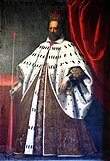 | Cosimo I de' Medici | 12 June 1519 – 21 April 1574 | 21 August 1569 – 21 April 1574 | (1) Eleanor of Toledo 29 June 1539 Florence 11 children (2) Camilla Martelli 1570 1 daughter | Medici | Son of Giovanni dalle Bande Nere, later became the first Grand Duke of Tuscany. |
 | Francesco I de' Medici | 25 March 1541 – 19 October 1587 | 21 April 1574 – 17 October 1587 | (1) Joanna of Austria 18 December 1565 Florence 8 children (2) Bianca Cappello 10 June 1579 1 son | Medici | Son of Cosimo I |
 | Ferdinando I de' Medici | 30 July 1549 – 3 February 1609 | 19 October 1587 – 7 February 1609 | Christina of Lorraine 1589 Florence 9 children | Medici | Son of Cosimo I |
 | Cosimo II de' Medici | 12 May 1590 – 28 February 1621 | 17 February 1609 – 28 February 1621 | Maria Maddalena of Austria 1608 8 children | Medici | Son of Ferdinando I |
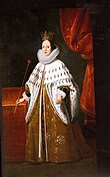 | Ferdinando II de' Medici | 14 July 1610 – 23 May 1670 | 28 February 1621 – 23 May 1670 | Vittoria della Rovere 6 April 1637 4 children | Medici | Son of Cosimo II |
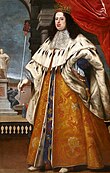 | Cosimo III de' Medici | 14 August 1642 – 31 October 1723 | 23 May 1670 – 31 October 1723 | Marguerite Louise d'Orléans 17 April 1661 Louvre 3 children | Medici | Son of Ferdinando II |
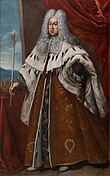 | Gian Gastone de' Medici | 24 May 1671 – 9 July 1737 | 31 October 1723 – 9 July 1737 | Anna Maria Franziska of Saxe-Lauenburg 2 July 1697 Düsseldorf no issue | Medici | Son of Cosimo III |
Habsburg-Lorraine grand dukes of Tuscany, 1737–1801
[edit]| Portrait | Name | Lifespan | Reign | Consorts | House | Succession |
|---|---|---|---|---|---|---|
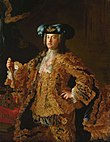 | Francesco II Stefano | 8 December 1708 – 18 August 1765 | 12 July 1737 – 18 August 1765 | Maria Theresa 12 February 1736 Vienna 16 children | Lorraine | Great-great-great-grandson of Francesco I, received Tuscany per the terms of the Treaty of Vienna |
 | Leopoldo I | 5 May 1747 – 1 March 1792 | 18 August 1765 – 22 July 1790 | Maria Luisa of Spain 16 February 1764 Madrid 16 children | Habsburg-Lorraine | Second son of Francesco II Stefano |
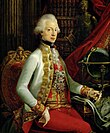 | Ferdinando III | 6 May 1769 – 18 June 1824 | 22 July 1790 – 3 August 1801 | (1) Luisa of Naples and Sicily 19 September 1790 Vienna 6 children (2) Maria Ferdinanda of Saxony 6 May 1821 Florence no issue | Habsburg-Lorraine | Second son of Leopoldo I |
Bourbon-Parma kings of Etruria, 1801–1807
[edit]Period that the Bourbon-Parma were placed as "Kings" by Napoleon in the Kingdom of Etruria. The Kingdom was a creation of Napoleon to replace the Grand Duchy of Tuscany, comprising a large part of modern Tuscany.[8]
| Portrait | Name | Lifespan | Reign | Consorts | House | Succession |
|---|---|---|---|---|---|---|
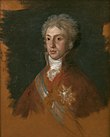 | Ludovico I | 5 July 1773 – 27 May 1803 | 21 March 1801 – 27 May 1803 | Maria Luisa of Spain 25 August 1795 Madrid 2 children | Bourbon-Parma | Grandson of Francesco II Stefano |
 | Ludovico II | 22 December 1799 – 16 April 1883 | 27 May 1803 – 10 December 1807 | Maria Teresa of Savoy 5 September 1820 Lucca 2 children | Bourbon-Parma | Son of Ludovico I |
Tuscany was annexed by France, 1807–1814. Napoleon's sister Elisa Bonaparte was given the honorary title of Grand Duchess of Tuscany, but did not actually rule over the region.
Habsburg-Lorraine grand dukes of Tuscany, 1814–1860
[edit]| Portrait | Name | Lifespan | Reign | Consorts | House | Succession |
|---|---|---|---|---|---|---|
 | Ferdinando III | 6 May 1769 – 18 June 1824 | 27 April 1814 – 18 June 1824 | (1) Luisa of Naples and Sicily 19 September 1790 Vienna 6 children (2) Maria Ferdinanda of Saxony 6 May 1821 Florence no issue | Habsburg-Lorraine | Restored |
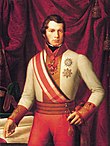 | Leopoldo II | 3 October 1797 – 29 January 1870 | 18 June 1824 – 21 July 1859 | (1) Maria Anna of Saxony 28 October 1817 Dresden 4 children (2) Maria Antonia of the Two Sicilies 7 June 1833 Naples 10 children | Habsburg-Lorraine | Son of Ferdinando III |
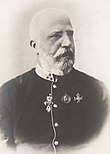 | Ferdinando IV | 10 June 1835 – 17 January 1908 | 21 July 1859 – 22 March 1860 | (1) Anna of Saxony 24 November 1856 Dresden 2 daughters (2) Alice of Parma 11 January 1868 Frohsdorf 10 children | Habsburg-Lorraine | Son of Leopoldo II |
Leopoldo II was driven from Tuscany by revolution from 21 February to 12 April 1849, and again on 27 April 1859. He abdicated in favor of his son, Ferdinando IV, on 21 July 1859, but Ferdinando IV was never recognized in Tuscany, and was deposed by the provisional government on 16 August. Tuscany was annexed by Piedmont-Sardinia on 22 March 1860.[9]
See also
[edit]- March of Tuscany § Margraves of Tuscany, 812–1197
- History of Tuscany § Republican governments, c. 1000–1805
- List of heads of state of Florence (1434 to 1569)
- List of Tuscan consorts
- Grand Duchy of Tuscany
- History of Tuscany
References
[edit]- ^ "COSIMO I de' Medici, duca di Firenze, granduca di Toscana in "Dizionario Biografico"". www.treccani.it (in Italian). Retrieved 2023-06-30.
- ^ "Storia della famiglia Medici di Firenze". Skuola.net - Portale per Studenti: Materiali, Appunti e Notizie (in Italian). Retrieved 2023-06-30.
- ^ "ALESSANDRO de' Medici, primo duca di Firenze in "Dizionario Biografico"". www.treccani.it (in Italian). Retrieved 2023-06-30.
- ^ "La dinastia dei Medici: chi furono i signori di Firenze che governarono per centinaia di anni". www.visitflorence.com. Retrieved 2023-06-30.
- ^ Candidi, Vieri Tommasi (2019-08-29). "Palazzo Pitti: il più prestigioso edificio di Firenze dai Medici ai Savoia". TuscanyPeople (in Italian). Retrieved 2023-06-30.
- ^ "Toscana in "Dizionario di Storia"". www.treccani.it (in Italian). Retrieved 2023-05-27.
- ^ Diaz, Furio. Storia d'Italia. Il Granducato di Toscana. I Medici (in Italian). ISBN 8802024510.
- ^ "Kingdom of Etruria | historical kingdom, Europe | Britannica". www.britannica.com. Retrieved 2023-06-30.
- ^ Redazione (2014-09-19). "LA FINE DEL GRANDUCATO DI TOSCANA". PostPopuli. Retrieved 2023-06-30.


 French
French Deutsch
Deutsch